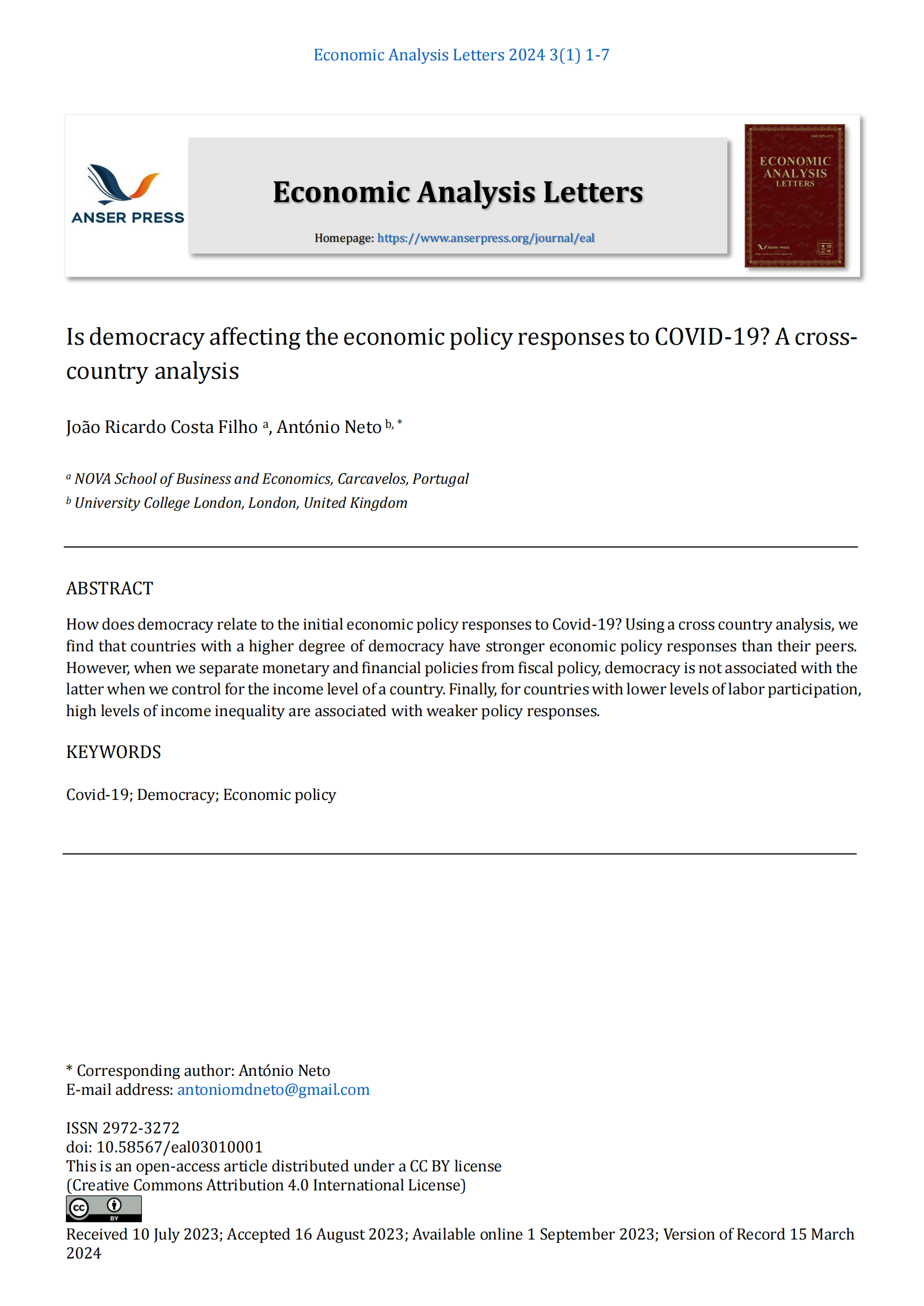Is democracy affecting the economic policy responses to COVID-19? A cross-country analysis
DOI:
https://doi.org/10.58567/eal03010001Keywords:
Covid-19; Democracy; Economic policyAbstract
How does democracy relate to the initial economic policy responses to Covid-19? Using a cross country analysis, we find that countries with a higher degree of democracy have stronger economic policy responses than their peers. However, when we separate monetary and financial policies from fiscal policy, democracy is not associated with the latter when we control for the income level of a country. Finally, for countries with lower levels of labor participation, high levels of income inequality are associated with weaker policy responses.
References
Bitara, M., Ouadghirib, I. E., and J. Peillex (2023). A cross-institutional exploratory investigation of COVID-19 spread: formal vs. informal institutions. Applied Economics, 55 (35): 4146-4163. https://doi.org/10.1080/00036846.2022.2125495
Correia, S. (2016). A feasible estimator for linear models with multi-way fixed effects. Preprint at http://scorreia.com/research/hdfe.pdf
Correia, S., Luck, S., and Verner, E. (1918). Pandemics depress the economy, public health interventions do not: Evidence from the 1918 flu. Available at SSRN: https://ssrn.com/abstract=3561560
DeLong, J. B., Summers, L. H., Feldstein, M., and Ramey, V. A. (2012). Fiscal policy in a depressed economy. Brookings Papers on Economic Activity, pages 233–297. https://www.jstor.org/stable/23287218
Elgin, C., Basbug, G., and Yalaman, A. (2020). Economic Policy Responses to a Pandemic: Developing the covid-19 Economic Stimulus Index. Covid Economics: Vetted and Real-Time Papers, 3. https://cepr.org/system/files/publication-files/101355-covid_economics_issue_3.pdf#page=44
Farzanegan, M. and H. F. Gholipour (2023). COVID-19 fatalities and internal conflict: Does government economic support matter? European Journal of Political Economy, 78:102368. https://doi.org/10.1016/j.ejpoleco.2023.102368
Feenstra, R. C., Inklaar, R., and Timmer, M. P. (2015). The next generation of the Penn World Table. American Economic Review, 105(10): 3150–82. https://doi.org/10.1257/aer.20130954
Ferraresi, M., Kotsogiannis, C., Rizzo, L., and R. Secomandi (2020). The ‘Great Lockdown’ and its determinants. Economics Letters, 197: 109628. https://doi.org/10.1016/j.econlet.2020.109628
Guerrieri, V., Lorenzoni, G., Straub, L., and Werning, I. (2020). Macroeconomic Implications of COVID-19: Can Negative Supply Shocks Cause Demand Shortages? American Economic Review, 112(5): 1437-1474. https://doi.org/10.1257/aer.20201063
Guimaraes, P. and Portugal, P. (2010). A simple feasible procedure to fit models with high-dimensional fixed effects. The Stata Journal, 10(4): 628–649. https://doi.org/10.1177/1536867X1101000406
Kaplan, G., Moll, B., and Violante, G. (2020). Pandemics according to HANK. PowerPoint presentation, LSE, 31 March.
Solt, F. (2016). The standardized world income inequality database. Social science quarterly, 97(5), 1267-1281. https://doi.org/10.1111/ssqu.12295
Toxvaer, F. (2020). Voluntary and mandatory social distancing: Evidence on Covid-19 exposure rates from Chinese provinces and selected countries. Covid Economics: Vetted and Real-Time Papers, 7. https://doi.org/10.3386/w27039

Downloads
Published
How to Cite
Issue
Section
License
Copyright (c) 2023 João Ricardo Costa-Filho, António Neto

This work is licensed under a Creative Commons Attribution 4.0 International License.